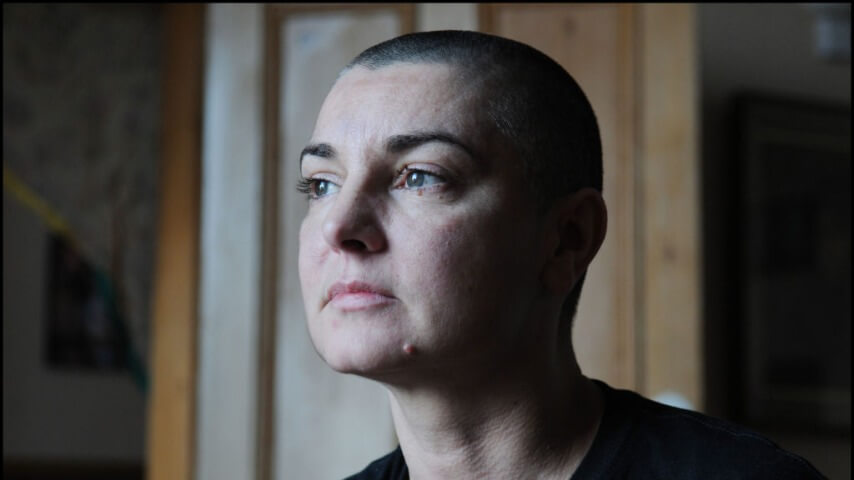Sinéad O’Connor spent the last years of her career perched on the precipice of a comeback that never quite arrived. I’m Not Bossy, I’m The Boss, the album she delivered in August 2014—the last one she released during her lifetime—is the record that came the closest to attracting the audience she once had at her popular peak in the early 1990s.
That bid for listeners was deliberate. After spending a decade wandering through an indie wilderness, O’Connor reunited with John Reynolds, the producer of her first two albums and her first husband, for How About I Be Me (And You Be You)?, a 2012 album that saw the singer/songwriter working upon the largest canvass she had since Faith And Courage, the 2000 album that marked her last for a major label.
O’Connor’s move toward characters also stemmed from filmmakers asking her to contribute original songs to their movies. Although nothing materialized, her attempts at writing for the silver screen changed her creative process. “I got in the habit of writing from the point of view of characters,” she told Medium. “It was a bit like being a puppet master: There’d be elements of yourself in them, but you had a whole other personality or set of experiences to work with. And I’d write the songs, but I wouldn’t give them to the movie people.” Stepping outside of herself allowed O’Connor to explore new emotional territory. “I wanted to write love songs, which I’d never done before. But I also wanted to illustrate the maturing of a female character. She matures from a romantic girl who puts the idea of romance on a pedestal into someone who understands the difference between love and romance,” O’Connor told Salon.
There is a distinct romantic streak that runs throughout I’m Not Bossy, I’m The Boss, one that surges to the surface on the insistent “Kisses Like Mine,” one of the sharpest pop songs O’Connor ever wrote. O’Connor doesn’t avoid autobiography on the album—when she rails about the viciousness of the music industry in “8 Good Reasons,” singing “I love to make music/But my head got wrecked by the business,” it’s impossible not to think of the raw deal she received from the record business—but she’s one of many personalities populating I’m Not Bossy, a distinction that reveals itself upon a close listen because of her absolute believability as a vocalist; the passion and grit make her performances feel confessional. Chalk some of that up to O’Connor inhabiting the characters she plays in a process she called “a Stanislavski method singer” in a nod to the famed acting teacher. She elaborated to Salon, “When you’re up on the stage or in the studio, you don’t really know what the character is going to do. You can’t plan for it as such. You have the words that are written on the page, but you don’t know how they’re going to come out or how that character is going to express herself through you.”
O’Connor often brought up the Stanislavski method throughout the publicity campaign for I’m Not Bossy, I’m The Boss, nearly as frequently as she mentioned how she drew inspiration from blues. She took pains to highlight that she didn’t favor the rural, plaintive country blues of the Delta; she preferred the high spirits of Chicago blues, blues she characterized as “the happy funky blues.”
Squint and it’s possible to hear some blues echoing through I’m Not Bossy. “Dense Water Deeper Down” is underpinned by a bright, bluesy shuffle, and the percolating funk of “James Brown” is rooted in R&B, even if the presence of saxophonist Seun Kuti, the son of the Afrobeat legend Fela Kuti, helps expand its musical purview. The blues connection can’t quite be reduced to a simple influence. Rather, O’Connor’s fondness for the robust good times of Chicago blues leads her to make a lively, open-hearted record that has quite a different character than most of her other works; it is the rare Sinéad O’Connor album that could conceivably be called fun.
That sense of playfulness extends to the album art depicting O’Connor in a form-fitting outfit and black wig, an image that wasn’t originally intended to be placed on the cover. At the end of a photo shoot, the singer thought, “Why don’t I get done up like a girl? We could do two or three shots to create some publicity for the album.” All concerned decided that the images would attract attention, as it’d answer the question “Guess what Sinéad O’Connor looks like when she makes an effort?,” as she told NPR.
The photograph wasn’t the only last-minute change for the album. Initially called The Vishnu Room after a meditative highlight on the record, O’Connor renamed the album in the wake of the Ban Bossy initiative, launched by Facebook executive Sheryl Sandberg. She recalled to NPR, “I had never heard of Sheryl Sandberg before when the campaign started. I saw this great picture of Beyoncé with this great saying behind her: ‘I’m not bossy, I’m the boss.’ And I know the campaign was directed at young girls, but it actually caused me, as a female boss, to take my power. I was able, for the first time in my life, to make executive, proper decisions and have around me the kind of people who actually will treat me like I am the boss.”
That swagger infuses I’m Not Bossy, I’m The Boss, suggesting that O’Connor was settling into a middle-aged stride. Unfortunately, that wasn’t quite the case. After releasing a cover of Mahalia Jackson’s “Trouble Of The World” as a Black Lives Matter benefit single in 2020, she scrapped plans to release No Veteran Dies Alone, a nearly-completed album she recorded with David Holmes that the producer described to Rolling Stone as “emotional and really personal.” Two years after this decision, O’Connor died unexpectedly of pulmonary disease and asthma at the age of 56 on July 26, 2023. Her death leaves I’m Not Bossy, I’m The Boss as an unintentional final album and it’s a moving farewell, capturing the singer-songwriter at a moment when she was reinvigorated by the joy of making music.









































